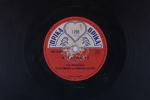Difference between revisions of "Opika-1298-part-16758-21"
From MUSICAL HERITAGE ORGANIZATION
(→{{int:license-header}}) |
Lena Vinta (talk | contribs) (Replacing old Flac-url with new Flac-url) |
||
| (4 intermediate revisions by 2 users not shown) | |||
| Line 1: | Line 1: | ||
== Audio file information == | == Audio file information == | ||
{{Audio file | {{Audio file | ||
| − | | | + | |Image= StamperID-{{PAGENAME}}.jpg |
|Label= [[Wikipedia:Opika|Opika]] | |Label= [[Wikipedia:Opika|Opika]] | ||
|Catalogue number= 1298 | |Catalogue number= 1298 | ||
| Line 7: | Line 7: | ||
|Matrix= M3-141745, PART 16758-21 | |Matrix= M3-141745, PART 16758-21 | ||
|Released= between 1955 and 1959 | |Released= between 1955 and 1959 | ||
| − | |Recorded= between 1955 and 1959 | + | |Recorded= between 1955 and 1959<ref name="recdate">[https://excavatedshellac.com excavatedshellac.com]: ''The label Opika was based in the Belgian Congo, and is equally as important as the Congolese labels Ngoma and Loningisa, and just as rewarding to track down. It’s not clear from my research how long Opika lasted as a company, but probably not much further than the mid- to late 1950s.'', [https://excavatedshellac.com/2008/04/27/njembe-paulemond-gwet-paulemond-a-ye-nsinga-ndinga/ Link] to the record</ref> |
|Coupling= between 1955 and 1959 | |Coupling= between 1955 and 1959 | ||
|Cutout date= unknown | |Cutout date= unknown | ||
| Line 21: | Line 21: | ||
|Content= Ethnic/traditional music in [[Wikipedia:Baoulé language|Baoulé language]] ([[Wikipedia:Ivory Coast|Ivory Coast]]) | |Content= Ethnic/traditional music in [[Wikipedia:Baoulé language|Baoulé language]] ([[Wikipedia:Ivory Coast|Ivory Coast]]) | ||
|Genre= African music | |Genre= African music | ||
| − | |FLAC= [http://pool.publicdomainproject.org/audio/flac/ | + | |FLAC= [http://pool.publicdomainproject.org/audio/flac/opika/opika-1298-part-16758-21.flac FLAC], [[Commons:File:PDP-CH - Dialobrou et Diezou Akissi - Assayabwe - Baoule - Opika-1298-part-16758-21.flac|FLAC (Commons)]] |
|Ogg= none | |Ogg= none | ||
| − | |Pdch= 1 January | + | |Pdch= 1 January 2010 |
| − | |Pdeu= 1 January | + | |Pdeu= 1 January 2010 |
|Pdusa= 1 January 2019 | |Pdusa= 1 January 2019 | ||
| − | |Pdint= 1 January | + | |Pdint= 1 January 2030 |
|other_versions= | |other_versions= | ||
}} | }} | ||
| Line 51: | Line 51: | ||
[[Category:Dialobrou et Diezou Akissi]] <!-- Performer (Orchestra) --> | [[Category:Dialobrou et Diezou Akissi]] <!-- Performer (Orchestra) --> | ||
[[Category:Assayabwe]] <!-- Musical work (Official work title) --> | [[Category:Assayabwe]] <!-- Musical work (Official work title) --> | ||
| − | [[Category:PD CH | + | [[Category:PD CH 2010]] <!-- Public Domain --> |
| − | [[Category:PD EU | + | [[Category:PD EU 2010]] <!-- Public Domain --> |
[[Category:PD USA 2019]] <!-- Public Domain --> | [[Category:PD USA 2019]] <!-- Public Domain --> | ||
| − | [[Category:PD INT | + | [[Category:PD INT 2030]] <!-- Public Domain --> |
[[Category:PD:EURO-SD25]] <!-- Archive container --> | [[Category:PD:EURO-SD25]] <!-- Archive container --> | ||
[[Category:Audio file licenses]] | [[Category:Audio file licenses]] | ||
| − | [[Category: | + | [[Category:FLAC sound files]] <!-- FLAC --> |
[[Category:Carl Flisch collection]] <!-- License and description file --> | [[Category:Carl Flisch collection]] <!-- License and description file --> | ||
[[Category:Keith Monks 'Archivist Duo Omni' - RCM Mk. IX]] <!-- Cleaned with the RCM --> | [[Category:Keith Monks 'Archivist Duo Omni' - RCM Mk. IX]] <!-- Cleaned with the RCM --> | ||
[[Category:ELP LT-2XA]] <!-- Digitized with the ELP Laser turntable --> | [[Category:ELP LT-2XA]] <!-- Digitized with the ELP Laser turntable --> | ||
Latest revision as of 23:38, 8 August 2018
Audio file information
| Title/Work | Assayabwe | ||||
| Author(s)/Composer(s) | unknown | ||||
| Image(s) |
|
||||
| High resolution audio (Flac) | FLAC, FLAC (Commons) | ||||
| Compressed audio (Ogg Vorbis) | none | ||||
| Genre(s) | African music | ||||
| Content | Ethnic/traditional music in Baoulé language (Ivory Coast) | ||||
| Description | Opika 1298 | ||||
| Lyricist(s) | none | ||||
| Music arranger(s) | none | ||||
| Conductor(s) | none | ||||
| Performer(s) | Dialobrou et Diezou Akissi | ||||
| Vocal range | unknown | ||||
| Label | Opika | ||||
| Cat. no. | 1298 | ||||
| Order number | 13758 | ||||
| Matrix/StamperID | M3-141745, PART 16758-21 | ||||
| Place of recording | Léopoldville (Belgian Congo) | ||||
| 1st recording date | between 1955 and 1959[1]
|
||||
| Coupling date | between 1955 and 1959 | ||||
| Cutout date | unknown The date "unknown" was not understood. |
||||
| 1st release date | between 1955 and 1959 | ||||
| PD CH | 1 January 2010 | ||||
| PD EU | 1 January 2010 | ||||
| PD USA | 1 January 2019 | ||||
| PD INT | 1 January 2030 |
References
- ↑ excavatedshellac.com: The label Opika was based in the Belgian Congo, and is equally as important as the Congolese labels Ngoma and Loningisa, and just as rewarding to track down. It’s not clear from my research how long Opika lasted as a company, but probably not much further than the mid- to late 1950s., Link to the record
Licensing
| |
This file is in the public domain, because it is a recording based on a folkloric or traditional song which has fallen out of copyright and any recording rights to this version have expired. In Germany, this recording right is called "Leistungsschutz" and lasts for 50 years from the date the work was created. In the USA, it only applies to recordings "fixed" before February 15, 1972 (See Template:PD-US-record). For recordings from Italy, see Template:PD-Italy-audio. Other countries may have differing legislation. |
Licensing
| This work is in the public domain because its copyright has expired. This applies the European Union and those countries with a copyright term of life of the author plus 70 years and a copyright term of 70 years after the first publishing date.

|
